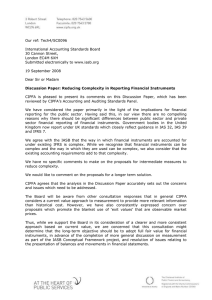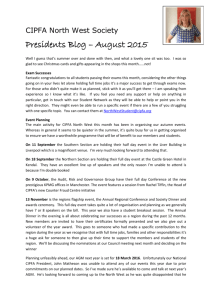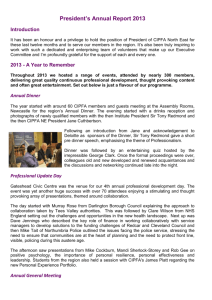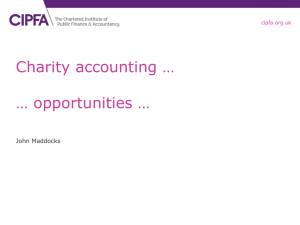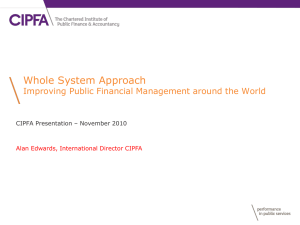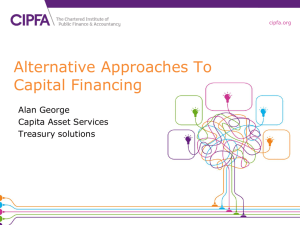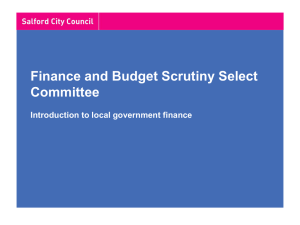Collaborative Working – Looking Beyond the Tradition
advertisement
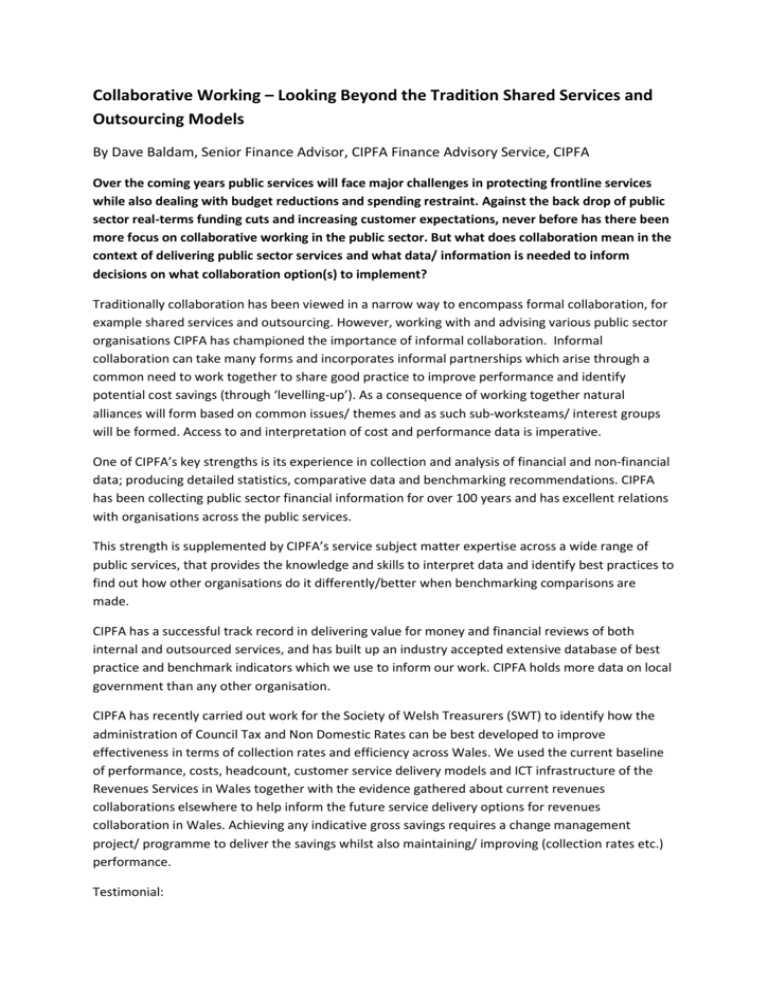
Collaborative Working – Looking Beyond the Tradition Shared Services and Outsourcing Models By Dave Baldam, Senior Finance Advisor, CIPFA Finance Advisory Service, CIPFA Over the coming years public services will face major challenges in protecting frontline services while also dealing with budget reductions and spending restraint. Against the back drop of public sector real-terms funding cuts and increasing customer expectations, never before has there been more focus on collaborative working in the public sector. But what does collaboration mean in the context of delivering public sector services and what data/ information is needed to inform decisions on what collaboration option(s) to implement? Traditionally collaboration has been viewed in a narrow way to encompass formal collaboration, for example shared services and outsourcing. However, working with and advising various public sector organisations CIPFA has championed the importance of informal collaboration. Informal collaboration can take many forms and incorporates informal partnerships which arise through a common need to work together to share good practice to improve performance and identify potential cost savings (through ‘levelling-up’). As a consequence of working together natural alliances will form based on common issues/ themes and as such sub-worksteams/ interest groups will be formed. Access to and interpretation of cost and performance data is imperative. One of CIPFA’s key strengths is its experience in collection and analysis of financial and non-financial data; producing detailed statistics, comparative data and benchmarking recommendations. CIPFA has been collecting public sector financial information for over 100 years and has excellent relations with organisations across the public services. This strength is supplemented by CIPFA’s service subject matter expertise across a wide range of public services, that provides the knowledge and skills to interpret data and identify best practices to find out how other organisations do it differently/better when benchmarking comparisons are made. CIPFA has a successful track record in delivering value for money and financial reviews of both internal and outsourced services, and has built up an industry accepted extensive database of best practice and benchmark indicators which we use to inform our work. CIPFA holds more data on local government than any other organisation. CIPFA has recently carried out work for the Society of Welsh Treasurers (SWT) to identify how the administration of Council Tax and Non Domestic Rates can be best developed to improve effectiveness in terms of collection rates and efficiency across Wales. We used the current baseline of performance, costs, headcount, customer service delivery models and ICT infrastructure of the Revenues Services in Wales together with the evidence gathered about current revenues collaborations elsewhere to help inform the future service delivery options for revenues collaboration in Wales. Achieving any indicative gross savings requires a change management project/ programme to deliver the savings whilst also maintaining/ improving (collection rates etc.) performance. Testimonial: ‘’The Society of Welsh Treasurers and Welsh Local Government Association required external expert advice to ascertain the feasibility of collaboration in the delivery of Council Tax and Non Domestic Rates Services in Wales. CIPFA undertook a high quality, tailored and professional review within tight deadlines. The review and subsequent comprehensive and clear report that CIPFA produced provides a solid base upon which local authorities in Wales can progress and realise the performance and cost opportunities, and scope for revenues collaboration.’’ Clive Teague, Head of Financial Services, Vale of Glamorgan Council. CIPFA has a successful track record in supporting public sector organisations to identify and implement the case for collaborative opportunities that delivers improvements in both costs and performance of areas of operation. Our support covers: Feasibility Study – to explore the opportunities and scope for collaboration in service delivery and procurement, and identify potential cost savings and performance opportunities; Business Case Development – to provide a more detailed evaluation of area(s) selected from this initial feasibility study for future collaboration as part of the project/ programme ‘gateway’ approval process; Financial Modelling - of the various collaboration options selected for more detailed evaluation and implementation; Performance Management Framework Development – to produce a common framework and set of protocols for use in the ongoing measurement of service performance; Operating/Service Level Agreements – to develop a set of common OLAs/SLAs for service(s) as part of the performance management framework development; Target Operating Model (TOM) Development – to assist in the design and development of the future TOMs for the service(s) including the development of a transformation plan in moving from the current Operation Models to the future TOM; and Market Development Opportunities – to identify opportunities for the future TOMs for the service(s) that could be offered as ‘remote’ service processing hubs to other Local Authorities; to also advise on external market development opportunities for any other Collaboration options. Find out how CIPFA can help your organisation to unlock the potential benefits of collaboration: Dave Baldam, e: dave.baldam@cipfa.org t: 01522 722 279 m: 07919 017 659.
